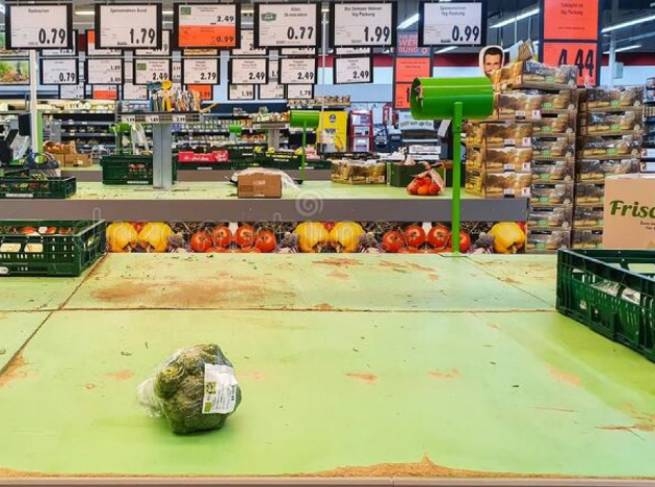British supermarkets are experiencing a vegetable crisis – for almost a month there have been shortages in the supply of cucumbers, tomatoes, peppers, broccoli, eggplant and other fresh vegetables. Where vegetables still reach the shelves, there are restrictions on their purchase.
The authorities admit that this situation in the country will continue until the end of March, and experts name a number of reasons for the vegetable crisis: bad weather in Morocco and Spain, higher energy prices, Brexit, price hikes in supermarkets.
How tells BB.LV, since mid-February, the British are facing unusual restrictions when buying vegetables – no more than three tomatoes, cucumbers, heads of lettuce or sweet pepper per customer. But this is the case if they are on sale – often the shelves for vegetables are simply empty.
At the beginning of last week, the head of the European Commission, Ursula von der Leyen, visited the UK and was greeted with a joke: you could take tomatoes with you. For the sake of fairness, it should be noted that there is no such problem in the EU countries. Therefore, opponents of Brexit and critics of the conservative government reproach: this situation is the result of exit from EU.
However, the problem is actually much more complex. During the winter season, British vegetable growers can provide only 5% of demand. Although it would be more correct to say – they could provide, since many greenhouses, due to rising energy prices, are still idle. Green House Growers manager Richard Diplock explained that electricity bills are now six times higher than they were a year ago:
“For this reason, we decided not to heat the greenhouses in December and January and only start planting in mid-February. As far as I know, many other tomato growers did the same.”
The situation is similar in the Netherlands, from where the British imported a lot of tomatoes, cucumbers and peppers. Recently, Morocco and Spain, which are the largest exporters of fruits and vegetables to the UK, have their own problems. Morocco has been plagued by heavy rains and floods, Spain has been plagued by drought for the past year, and temperatures have often been well below normal since autumn.
The Spanish fruit and vegetable exporters organization FEPEX said that in the first three weeks of February, 20% fewer tomatoes, cucumbers and eggplants were grown in Almería than at the same time in 2022. And only after these problems comes Brexit.
If the harvest is less than expected, and demand remains, it is much more profitable to export to the EU countries, and faster, because exporting to the UK is an extra bureaucratic hassle. The financial benefit should also be noted – the prices for vegetables in France or Germany are higher than in the UK. British supermarket chains are desperately fighting for customers, trying to offer goods at the lowest possible price, so they cannot pay suppliers more.
At the moment, everything suggests that the British will have to put up with a shortage of vegetables and fruits until at least early April, BBC predicts.







More Stories
Fruits and vegetables: imports up 50.2% in April
Greek products on their way to France
Reduced fees for POS transactions, limited bank fees